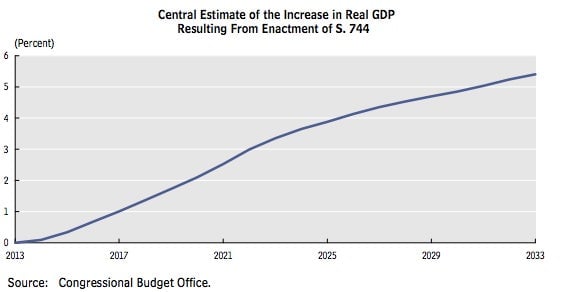The US immigration bill is the economic reform we’ve all been waiting for
The number-crunchers in the US government had some big news today: The immigration reform bill moving through congress is an economic winner, boosting growth and cutting federal deficits.

The number-crunchers in the US government had some big news today: The immigration reform bill moving through congress is an economic winner, boosting growth and cutting federal deficits.
Here are some headline numbers from the non-partisan Congressional Budget Office: In the next decade, passing the law would reduce federal budget deficits by $175 billion, since immigrants pay more in taxes than they collect in benefits, and it would increase real GDP by 3.3% in 2023 and 5.4% in 2033.
We’ve been saying it all along: Immigration reform isn’t just a compassionate plan to lift 10 million unauthorized immigrants out of legal purgatory, and it’s not just a scheme to fill the skies above the US-Mexico border with drones, though it is those things. Primarily, it’s a structural reform plan, the kind of long-term focused labor market reform that people who don’t like monetary and fiscal stimulus say is just the prescription for brightening America’s fairly dim economic prospects.
The law would increase the number of workers in the US, increase the number of jobs available, and after a period of adjustment with slightly lower wages for low-skilled workers, start increasing average wages. That’s a fairly common result, based on lots of research about how even low-skilled immigrants improve the economies they migrate to.
But maybe the most important thing it could do is solve America’s productivity problem. The “great stagnation“—the slowing pace of technological and other improvements that allow workers and capital to create more value—is a common explanation for slow economic growth in the United States. But immigration is broadly associated with innovation, and the CBO thinks that plans to let in more high-skilled immigrants will lift total factor productivity, a common measure, .07% higher in 2023 and 1% higher than expected in 2033. That’s something of a game-changer.
Yes, this is a bipartisan bill that cuts the deficit, boosts the economy and improves productivity. What could go wrong? Well, it could get caught up in partisan mistrust and xenophobia, but hope springs eternal.